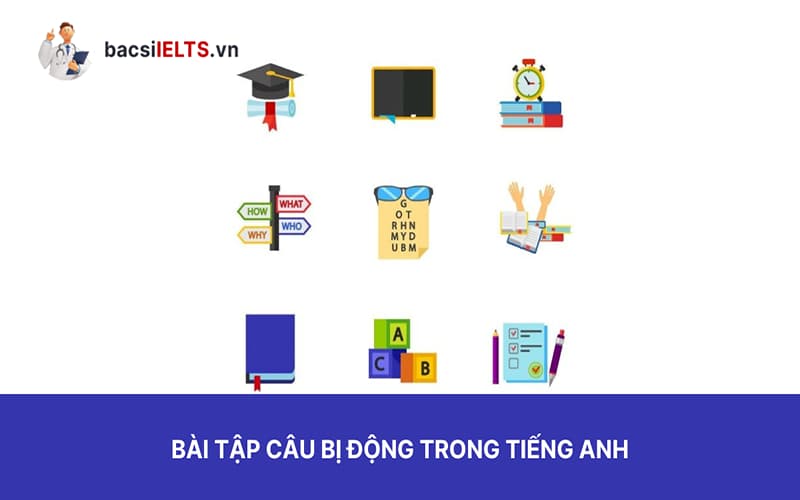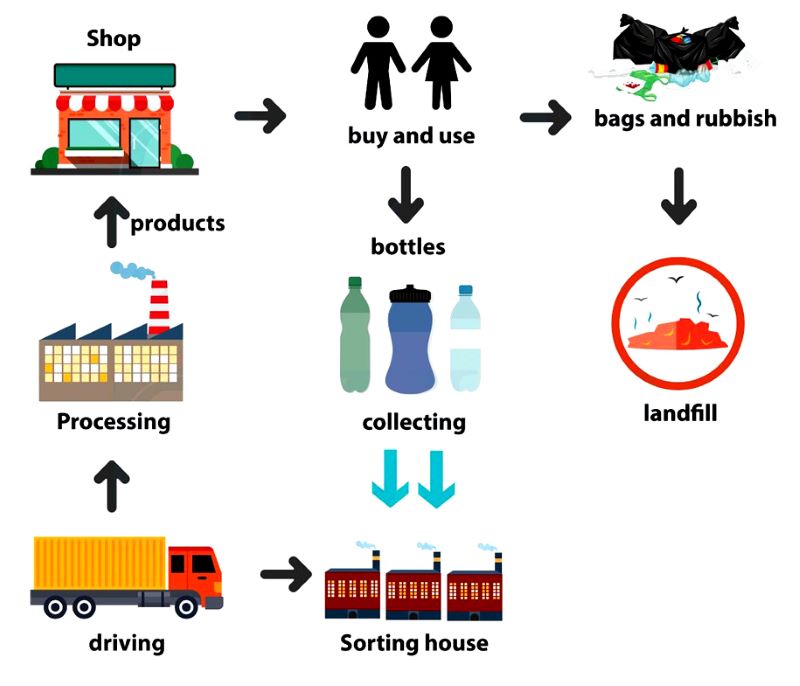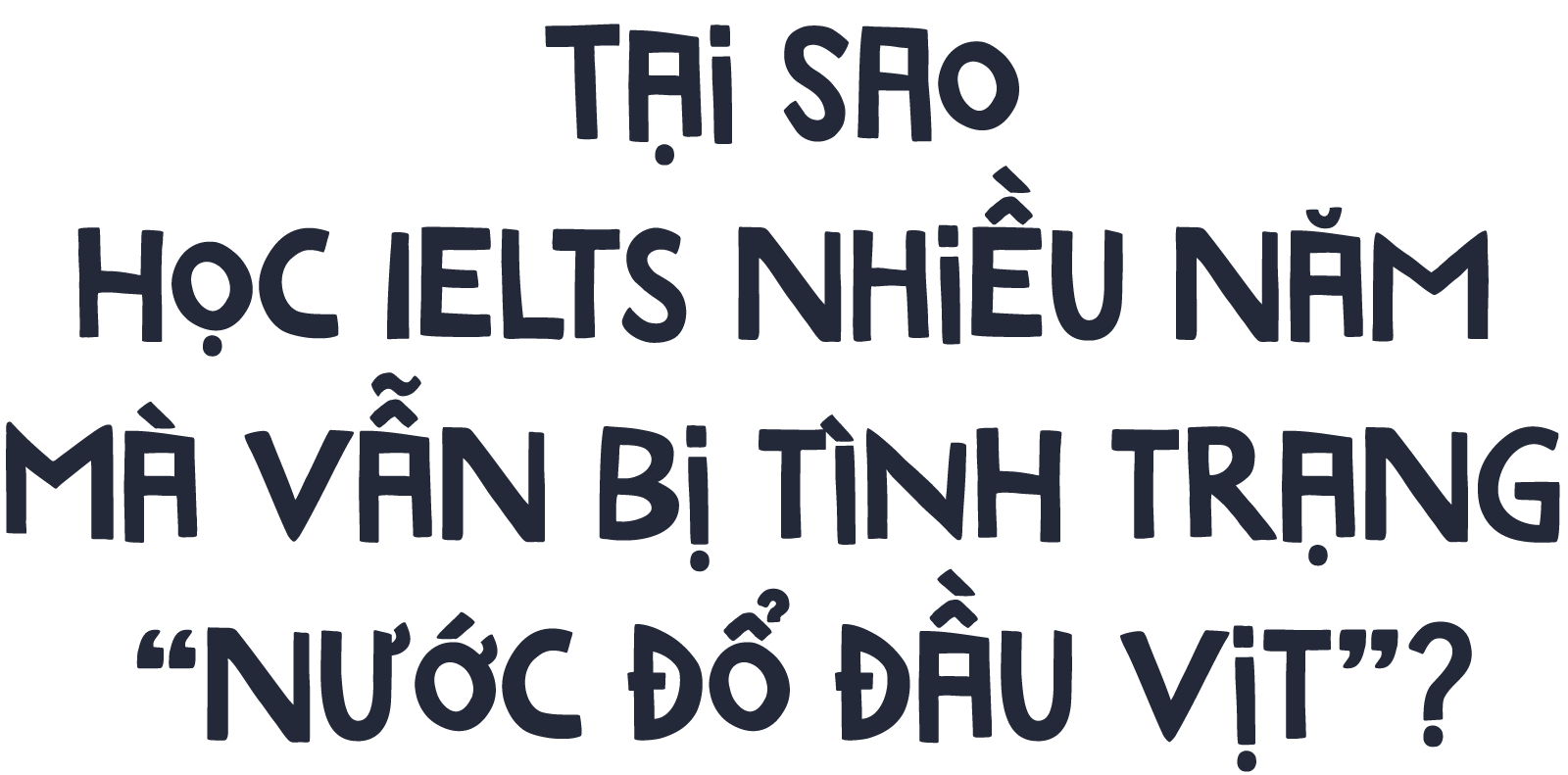Sau khi đã tìm hiểu tường tận về cấu trúc của câu bị động ở bài viết trước, bạn đọc cần tham khảo một số bài tập câu bị động trong tiếng anh có đáp án dưới đây nhằm ôn tập, củng cố lại kiến thức vừa học. Tất cả các bài tập đều được Bác sĩ IELTS biên soạn dựa trên giáo án riêng, cam kết bám sát theo mức độ từ dễ đến khó cùng lời giải chi tiết.

Bài tập câu bị động gồm những dạng nào?
Bài tập về câu bị động có rất nhiều dạng khác nhau, đầy đủ các mức độ từ dễ đến khó. Bài viết phân chia bài tập câu bị động trong Tiếng Anh ra các dạng sau đây:

Bài tập câu bị động có đáp án
Bài tập viết lại câu bị động
Exercise 1: Rewrite these sentences in passive voice
- She is going to sign the contract next week.
……………………………………………………………
- How can you change the situation?
……………………………………………………………
- Mai send a love letter to Tung.
……………………………………………………………
- She must meet the deadline.
……………………………………………………………
- He has not done his assignment yet.
……………………………………………………………
- You have to confirm your booking with the reception at least one day.
……………………………………………………………
- He did not phone her last night.
……………………………………………………………
- Will you improve your speaking skill in the future?
……………………………………………………………
- People suggested that teenagers should spend more time with their parents.
……………………………………………………………
- Lan is taking an IELTS test at the moment.
……………………………………………………………
- This assignment need to apply “bai tap ve cau bi dong”.
……………………………………………………………..
Bài tập câu bị động có đáp án, điền từ vào chỗ trống
Exercise 2: Put the correct verb form in brackets
1. Brian had his car (repair) ………….. by a mechanic.
2. John got David (type) ……………… his paper.
3. We got our house (paint) ……………… last month.
4. Dr James is having the students (write ) ………………. a composition
5. Laura got her transcripts (send) ………………. to the university.
6. Daniel is having his hair (cut) ………………… tomorrow.
7. Will Mrs. Ellen have the porter (carry) ………………. her luggage to her car?
Bài tập viết lại câu bị động, bao gồm bài tập câu bị động thì hiện tại đơn và quá khứ đơn
Exercise 3: Rewrite these Yes/No questions in passive voice
1. Do they teach English here?
……………………………………………………………
2. Will you invite her to your wedding party?
……………………………………………………………
3. Has Tom finished the work?
……………………………………………………………
4. Did the teacher give some exercises?
……………………………………………………………
5. Have they changed the window of the laboratory?
……………………………………………………………
6. Is she going to write a poem?
……………………………………………………………
7. Is she making big cakes for the party?
……………………………………………………………
8. Are the police making inquiries about the thief?
……………………………………………………………
9. Must we finish the test before ten?
……………………………………………………………
10. Will buses bring the children home?
……………………………………………………………
11. Have you finished your homework?
……………………………………………………………
- Has your teacher required you to prepare “bai tap ve cau bi dong”?
……………………………………………………..
Exercise 4: Rewrite these questions in passive voice
1. Why didn’t they help him?
……………………………………………………………
2. How many games has the team played?
……………………………………………………………
3. Where do people speak English?
……………………………………………………………
4. Who are they keeping in the kitchen?
……………………………………………………………
5. How can they open this safe?
……………………………………………………………
6. What books are people reading this year?
……………………………………………………………
7. How did the police find the lost man?
……………………………………………………………
8. Who look after the children for you?
……………………………………………………………
9. How long have they waited for the doctor?
……………………………………………………………
10. What time can the boys hand in their papers?
……………………………………………………………
11. Who lend you this book?
……………………………………………………………
12. How many marks does the teacher give you?
……………………………………………………………
13. Who will correct our homework about “bai tap ve cau bi dong”?
…………………………………………………..
Có thể bạn quan tâm:
Câu bị động không ngôi (It is said that): Cách dùng, bài tập
Bài tập câu bị động trong Tiếng Anh thông qua đoạn văn
Exercise 5: Complete the paragraph with the right form of verb

The given diagram (illustrate) ……… the process of plastic recycling.
Overall, there are essentially six stages in the plastic recycling process, beginning with the buying, using and discarding of new plastic products and ending with newly (recycle) …….. products entering the market again.
In the first stage, new products are displayed in shops (purchase) ………., (use) ………. and (thrown) …….. away. Plastic bags, along with other garbage, (send) ………. and buried in landfill sites. Plastic bottles and containers however, (collected)……… for recycling. After being gathered, the plastic bottles are then taken to sorting houses where they are divided into different categories.
Lời giải chi tiết bài tập câu bị động

Exercise 1:
- The contract is going to be signed next week.
- How can the situation be changed?
- A love letter is sent to Tung by Mai.
- The deadline must be met.
- His assignment has not been done yet.
- Your booking has to be confirmed with the reception at least one day.
- She was not be phoned last night.
- Will your speaking skill be improved in the future?
- It is suggested that teenagers should spend more time with their parents.
- The IELTS test is being taken by Lan at the moment.
- “bai tap ve cau bi dong” needs to be applied in this assignment.
Exercise 2:
1. repaired
2. to type
3. painted
4. write
5. sent
6. cut
7. carry
Exercise 3:
1. Is English taught here?
2. Will she be invited to your wedding party?
3. Has the work been finished by Tom?
4. Were some exercises given by the teacher?
5. Has the window of the laboratory been changed?
6. Is a poem going to be written?
7. Are big cakes being made for the party?
8. Are inquires about the thief being made by the police?
9. Must the test be finished before ten?
10. Will the children be brought home with buses?
11. Has your homework been finished?
12. Have you been required to prepare “bai tap ve cau bi dong”?
Exercise 4:
1. Why wasn’t he helped?
2. How many games have been played by the team?
3. Where is English spoken?
4. Who are being kept in the kitchen?
5. How can this be opened safe?
6. What books are being read this year?
7. How was the lost man found by the police?
8. By whom are the children looked after for you?
9. How long has the doctor been waited for?
10. What time can their papers be handed in by the boys?
11. By whom is this book lent?
12. How many marks are given to you by the teacher?
13. Our homework about “bài tap ve cau bi dong” will be corrected by who?
Exercise 5:
The given diagram illustrates the process of plastic recycling.
Overall, there are essentially six stages in the plastic recycling process, beginning with the buying, using and discarding of new plastic products and ending with newly recycled products entering the market again.
In the first stage, new products displayed in shops are purchased, used and thrown away. Plastic bags, along with other garbage, are sent and buried in landfill sites. Plastic bottles and containers however, are collected for recycling. After being gathered, the plastic bottles are then taken to sorting houses where they are divided into different categories.
Once the plastic has been sorted, it is then loaded onto trucks and transported to factories where it is processed and made into new plastic products. These new, recycled plastic products are then finally distributed back to retail shops where they are sold, reused and discarded once again, thereby continuing the process.
Tham khảo thêm các bài viết khác:
Bài tập phát âm s z iz có đáp án
Bài tập câu cảm thán tiếng Anh
Bài tập về câu ghép trong tiếng Anh
Kết luận
Các dạng bài tập thường gặp nhất của câu bị động trong Tiếng Anh đã được Bác sĩ IELTS cung cấp đầy đủ kèm lời giải chi tiết nhất. Hy vọng bạn hoàn thành trọn vẹn được phần bài tập câu bị động trong Tiếng Anh có đáp án ở trên và chúc bạn sớm đạt đến trình độ Tiếng Anh như mong đợi!











